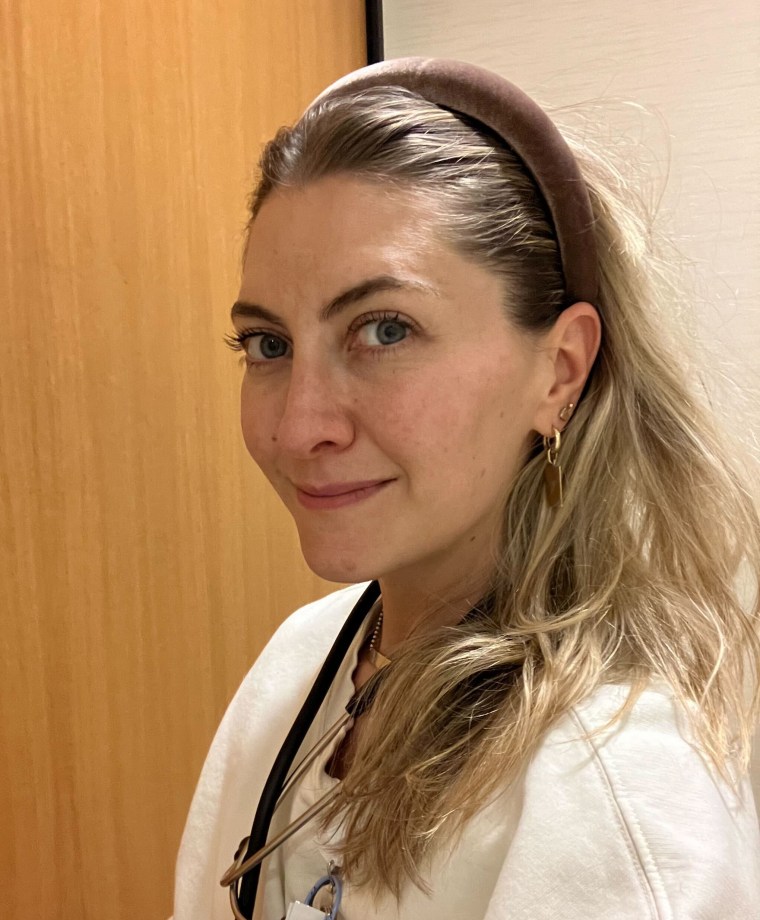Becoming a nurse during Covid, a former producer doubled her hours but found a purpose
How are you making ends meet in this economy? We want to hear your story. Email us at CheckbookChronicles@nbcuni.com
Shannon Penney, 37, New York City
- Recently finished her first year as a registered nurse making $120,000 a year.
- Has built up robust savings, but costs for her dog and mental health care can still squeeze her budget.
- New job has given her a window into the inequalities of the health care system.
Unlike most people who switched jobs during the Great Resignation, Shannon Penney is working twice as much for roughly the same pay she made years ago. She wouldn’t change it.
Penney, 37, became disenchanted nearly a decade ago with her work as a freelancer in the advertising industry, but it took the pandemic for her to make a change. The decision dawned on her in the ER, sick with Covid-19 in the early days of a pandemic that would hammer her soon-to-be profession in ways it’s still recovering from.
“It put a bookmark in my head of like: This is really important,” said Penney, who recently completed her first full year as a registered nurse at NewYork-Presbyterian/Weill Cornell Medical Center in Manhattan.
Primary source of income: Working full-time as a registered nurse at NewYork-Presbyterian Hospital making $120,000 annually. That works out to roughly as much as she netted as a producer earning $1,200 per day but rarely notching consistent workweeks. She now has an employer-sponsored retirement account for the first time, but her hours are much longer.
“I knew it was going to be much more sacrificial,” she said. “But at the same time, I really felt like I owed something back to a society that had given me all of these privileges that I didn’t ask for or necessarily deserve.”

Living situation: A 550-square-foot Manhattan apartment that she bought in 2016 and shares with her dachshund, Baguda. The co-op building charges a $1,400 maintenance fee.
Economic outlook: Penney has never had to worry much about money. Her parents — a retired nurse and an investment banker — built and eventually sold their family’s “McMansion” in Westchester, New York, and later footed the bill for her nursing degree. She is also debt-free after her father paid off her $10,000 credit card balance in May.
Penney is quick to note that she’s “a very privileged white person” with minimal debt. “Sometimes it’s embarrassing to say it out loud, but that’s all I know how to do with it — just acknowledge it,” she said. “Do what you can with it to help other people. Pay it forward.”
After 12 years of producing commercials for big brands — dealing with budget cuts that forced her to lowball contractors and witnessing uncomfortable dynamics on shoots — Penney decided in March 2020 that she’d had enough. She enrolled in her nursing program soon afterward.
She’s sitting on more than $65,000 in retirement savings, much of it split nearly equally between a brokerage account and a Roth IRA, with the rest in her still-budding 403(b) account. With stock indexes smashing records, many savers with investments tied to the market have seen their nest eggs swell this year.
Penney has also stashed more than $36,000 in her personal savings. By contrast, the median bank account balance for adults ages 35-44 was $7,500 in 2022, according to the Federal Reserve. Only 43% of millennials say they could cover a $1,000 emergency expense, Bankrate has found.
I’m a shift worker, meaning I leave my house at 6:30 a.m. and I don’t get home until 8:30 p.m.
Shannon Penney, 37, New York City
But while Penney’s economic status differs from most of her peers’ and largely enabled her career move, that decision isn’t so unique. More than 1 in 5 young professionals say their work lacks purpose or meaning, Deloitte research has found, and many have taken advantage of a tight labor market to change that recently.
Budget pain points: Penney said her mental health care costs have gone up since she switched to nursing. While her psychiatrist is in-network with her insurance, her therapist of several years isn’t, resulting in a monthly bill of up to $1,000.
Ironically, “it took me [becoming] a nurse to not get that covered,” she said.
Despite her sturdy finances, Penney said, she finds herself watching her spending more lately.
“I still live very much within my means,” she said, adding that she sticks to a monthly budget and doesn’t splurge on luxuries like expensive clothes. “Some of the most privileged people in this country are not in a comfortable place.”
Working life: “I’m a shift worker, meaning I leave my house at 6:30 a.m. and I don’t get home until 8:30 p.m.,” Penney said. After having spent at least $2,000 a month on dog day care, she recently hired a walker, more than halving the expense.
The nursing field is regaining its footing after years of pandemic-induced turmoil. Burned-out nurses cycled out of the profession in recent years, but wages and staffing levels are improving, and labor groups continue to push to shore up workers’ livelihoods.
There were 6% more full-time registered nurses in the workforce last year than in 2019, a JAMA Health study found, and 1.2 million are expected to join by 2035, returning to pre-pandemic projections. The average U.S. nurse made around $94,500 annually last year, federal data shows, up from about $80,000 four years ago — barely outrunning inflation since then.
Hospitals have ramped up their retention efforts — from offering referral bonuses to streamlining intensive care training — as thousands of nurses have picketed for better pay and staffing ratios. NewYork-Presbyterian faced its own revolt last year, just before Penney joined, and it ultimately boosted wages and staffing commitments.
A closer view of a lopsided economy: Penney works on a hospital floor where wealthier patients can pay $1,500 a night for private rooms with concierge-like features such as a dedicated chef, round-the-clock attention and unlimited family visits.
In some ways, aspects of the economy that bothered Penney in her former career have proved inescapable — a realization she described as “absolute whiplash.”
“Going from the dazzle of production with celebrities, now you’re on this floor where there’s very high-profile people,” she said, “and you just instantly see how inequitable health care is.”
You may be interested

Why cellphone chats have become death sentences in cartel stronghold in Mexico
new admin - Oct 16, 2024Cellphone chats have become death sentences in the continuing, bloody factional war inside Mexico's Sinaloa drug cartel.Cartel gunmen stop youths…

Mistake made by 80% of runners raises risk of stroke and heart issues
new admin - Oct 16, 2024Around six million people in the UK run regularly, with three-quarters citing health as their main motivation. But these benefits…

NFL power rankings: Lions, Texans, Ravens make sure to the top after Week 6
new admin - Oct 16, 2024[ad_1] Join Fox News for access to this content Plus special access to select articles and other premium content with…

































